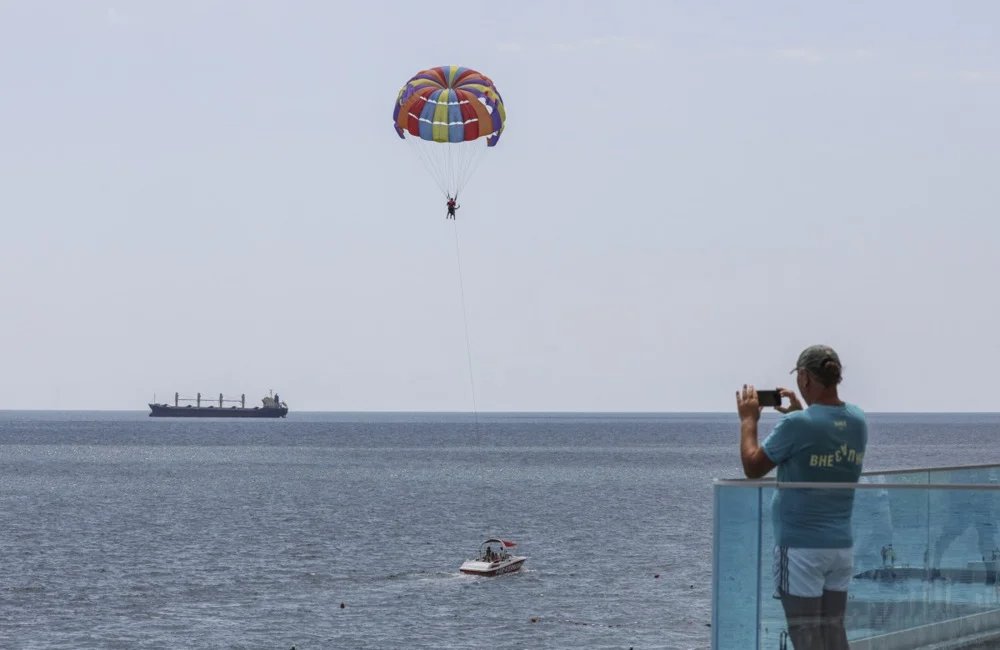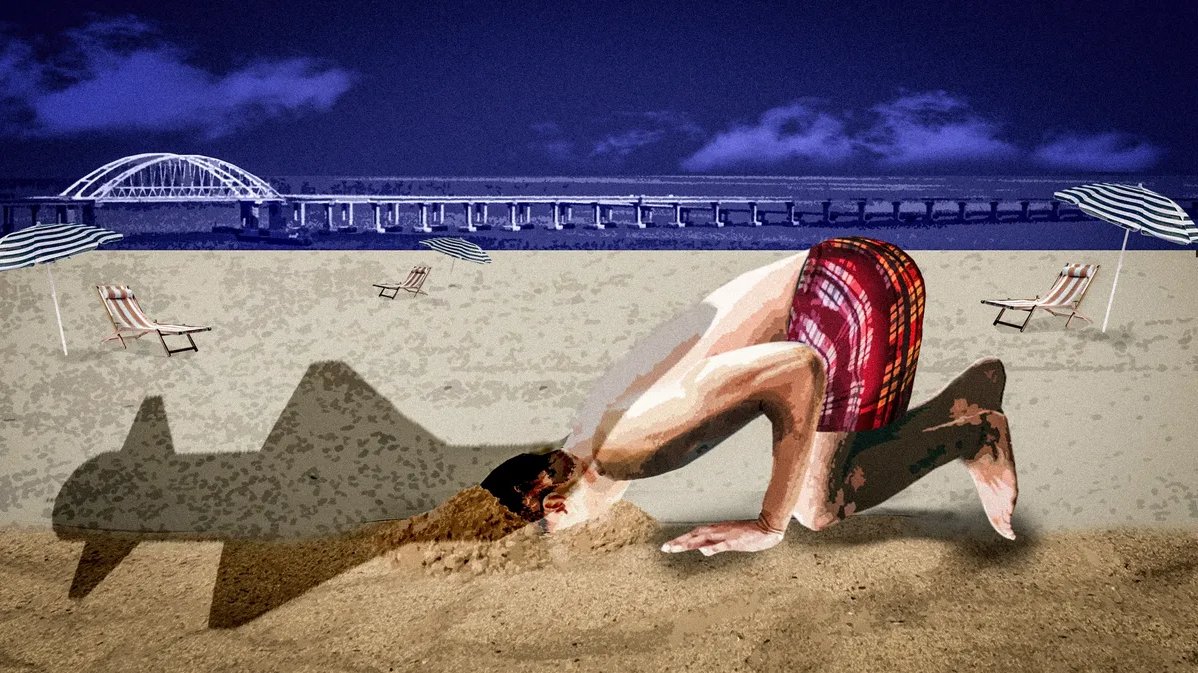Crimea’s tourist season is nearing its end. This year, the Russian-annexed peninsula has spent the summer amid drone attacks and explosions. A Novaya-Europe journalist spoke to locals residing across the region to see how the war affects Crimeans now.
Sevastopol
Sevastopol resident Alexander categorises the locals into three groups.
“Some actively support the war and stick the letter Z on their cars. Others hope and pray that Crimea will be liberated in the war, but only dare to say this to people they trust.”
“Apolitical” citizens are also there, but they probably have the hardest time: these are often Russians who moved to the region after 2014.
“They do not believe in either the Russian army or the mercy of Kyiv. They do not want the war, nor do they want Crimea to return to Ukraine,” Alexander explains.
If Ukraine liberates Crimea, the Russian presence on the peninsula will likely be declared undesirable or even illegal.
“We have become more anxious and intimidated,” Alexander says. “People on public transport either talk about routine stuff or keep to themselves.”
If Alexander notices someone looking into his phone, he immediately turns it off. He does not particularly want to end up on Crimean SMERSH, a Telegram channel that files complaints against residents of the region who oppose the current authorities and the invasion of Ukraine. War supporters also tend to keep quiet, Alexander says.
“I think many have gone quiet out of fear. I used to hear people in cafes say that it should not be happening. These people are now silent. I don’t think they’ve changed their minds, it’s just got scarier now.”
However, explosions, or the so-called “pops”, as the Russian media often refers to them, now instil less fear in Crimeans. Alexander says that Sevastopol residents do not fear them anymore. They see them as white noise that does not warrant fear, which will only make you anxious and stressed.
“Everyone has their own way of dealing with the war being so close. Some turn to work, hobbies, or volunteering, some read all the news and try to stay abreast of what’s going on, while others pretend that nothing is happening at all,” Alexander says.
Yevpatoria
Yevpatoria, a resort town in west Crimea, lives its own life. Student Evgenia moved back home here for the summer break. She didn’t really notice any drops in the tourist numbers here:
“I think it’s just like it was,” she said. “Around the same number of people as last year and in the pre-war times. Maybe those who prefer flying in are no longer coming, but train tickets are sold out instantly.”
Just like in Sevastopol, people tend to keep their opinions on the war to themselves: you won’t hear any conversations about it in the streets. Explosions are also a rare occurrence in the town, and any loud “pops” are greeted with astonishment, which later becomes a conversation piece for a little while, albeit among friends and family.
Evgenia points out that everyone is experiencing “background” anxiety: many have relatives in Ukraine who have been directly affected by the war,
others are trying to find out what will happen if Ukraine launches a counter-offensive effort, fearing that the fighting will reach Crimea, making locals “suffer properly”.
“People are more concerned that this bullshit will start in Crimea and they will have to run and hide. Some are scared for themselves. Some are just stressing about the possibility[of fighting in Crimea],” the woman says.
Other than that, the town on the surface is completely oblivious to the war, with the locals and tourists enjoying the summer. The only reminders of the atrocities taking place nearby are the instructions on how to get to the nearest bomb hideout painted on the walls and rare leaflets glued in public transport vehicles, inviting people to join the Russian army.
Kerch
The Crimean Bridge and Mount Mithridates are the main sights in the town of Kerch.
When the full-scale invasion of Ukraine began, Kerch now enjoys a different sight — people in military uniforms, strolling down the sea bank and the central street, say Mikhail and Anastasia who have lived here for the past three years. Mikhail works in IT, while Anastasia is a housewife.
Kerch has now turned into a town where service members spend their leave or get medical care.
Civilians, however, are less willing to spend their holidays in the militarised town. It is hard to imagine now that Kerch used to be a tourist hot spot.
Kerch does not speak much. Like in other cities and towns of the region, you won’t hear conversations about politics and war here: people are very careful about what they say and where.
Yevgeny Prigozhin’s June rebellion attempt was an exception: it was the talk of the town. Kerch was panicking the most on 8 October last year when a lorry blew up on the Crimean Bridge and damaged several sections. But the latest explosion on 17 July caused much less of a stir. It seems like people have got used to having something happening all the time.
People are worried because of the war, but no one has it in them to be stressed, say Anastasia and Mikhail.
“When asked if it’s scary to live in Kerch, everyone says the same: ‘It is when you think about it, but we are already used to it, so not really,” the couple says.

Yalta. Фото: EPA-EFE/STRINGER
Yalta
Yalta is one of the most popular tourist destinations of Crimea. The “city of happiness” has a lot of tourists, but still fewer than what it used to be. Darya, a local nail tech, says:
“You don’t know what to expect on any given summer day now: Yalta seems empty one day, and then it’s alive and full of life on the next, like it used to be before the war.”
The Covid pandemic dealt the first blow to Yalta’s tourism industry. Later, the war completely smashed any hope of getting back to the pre-Covid levels of tourism and revenues.
Many shops close down within several months from the opening, even in the most crowded places.
Darya says that her colleagues sometimes do engage in war discussions in public but only from the authorised positions: “they refer to the war as the special military operation and vilify Ukrainians”.
At the same time, Darya also works with people who oppose the war. “Those who are from Ukraine say things like: ‘A house was bombed yesterday, my father lives right next to it’. But they never mention this publicly.”
Darya says that it is easy to see what people think about the war only when they put on T-shirts and backpacks with Zs and Vs or even Putin’s portraits sometimes.
“These are mostly middle-aged men, but they are not a common sight here,” she says.
But as soon as you move further away from the centre, you notice anti-war writings on the walls and green stripes — one of the symbols of the anti-war resistance movement.
All cities and towns of Crimea are alike in one aspect — no one discusses the war openly. It is hard to understand who’s for and who’s against it. Whoever could and wanted to leave did so in the first year of the invasion. Those who are leaving now are doing so in fear of Ukrainian military advances or because they couldn’t flee right after the war began.
Join us in rebuilding Novaya Gazeta Europe
The Russian government has banned independent media. We were forced to leave our country in order to keep doing our job, telling our readers about what is going on Russia, Ukraine and Europe.
We will continue fighting against warfare and dictatorship. We believe that freedom of speech is the most efficient antidote against tyranny. Support us financially to help us fight for peace and freedom.
By clicking the Support button, you agree to the processing of your personal data.
To cancel a regular donation, please write to [email protected]

